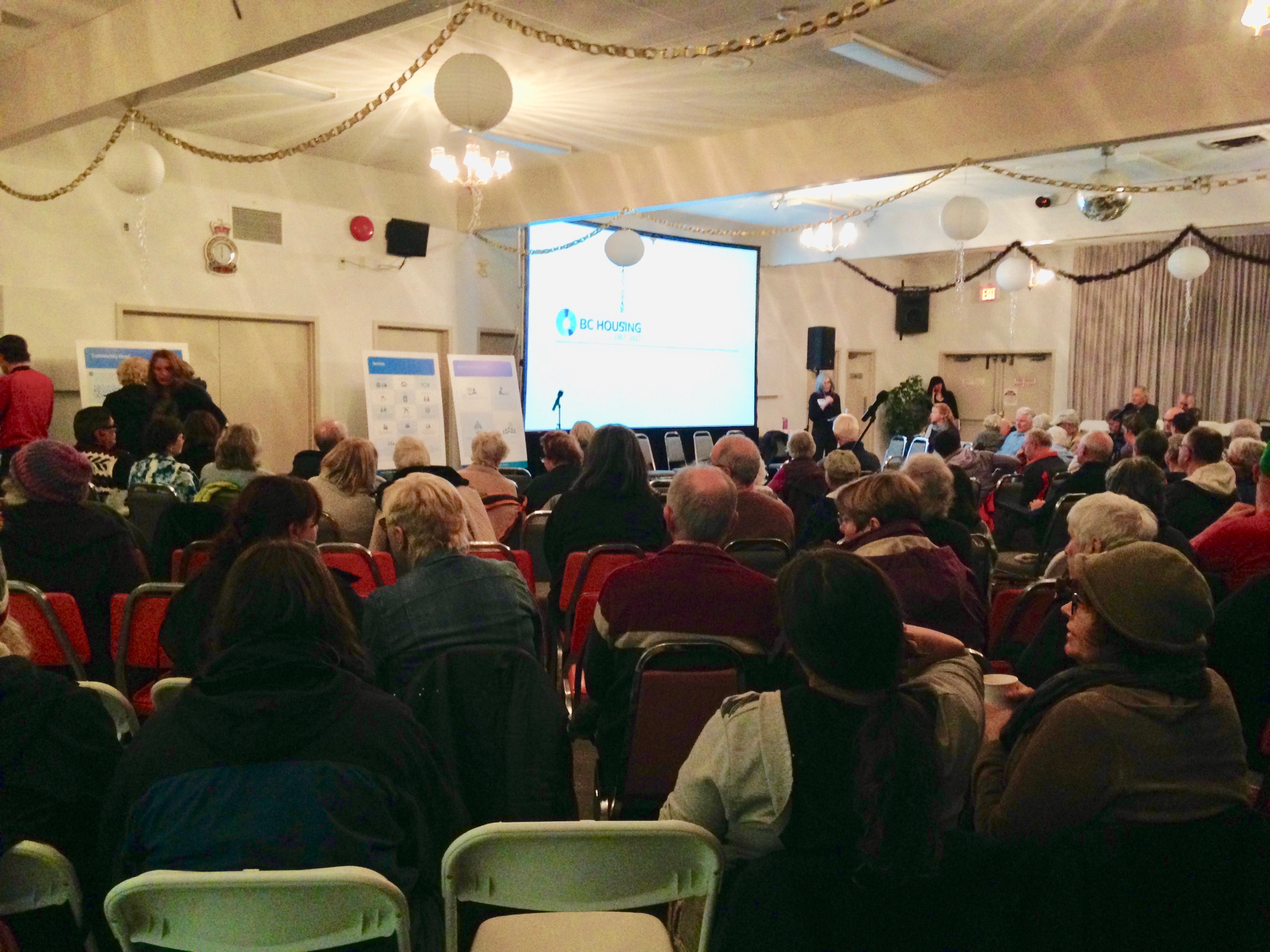
Public information meeting at Legion urges council to act fast on rezoning amendment; new shelter possibly open on December 21
By Margot Grant
Sechelt could have a new homeless shelter as early as Dec. 21 following a public information meeting that gave strong support to the plan to open the Upper Deck tourist hostel to those seeking emergency shelter.
More than 100 people attended the meeting at the Legion on Dec. 4, with 23 of the 33 speakers supporting the move. A member of the audience showed a petition with 2,500 signatures to open the new shelter immediately. Five speakers asked questions, and another five were critical of the proposal. All comments will be submitted in a report to council.
Town planner Angela Letman said the District of Sechelt is trying to expedite the opening, with first reading of the zoning amendment expected on Dec. 6, followed by a public hearing on December 19. That would be followed by second reading at a special council meeting on the same date, with third and fourth reading on December 20, after which the shelter could start operating.
“This is my recommendation to council,” Letman said. “If all goes well, the new shelter will open in 16 days from today.”
The current shelter at St. Hilda’s can accommodate 15 people, but Aaron Munro, associate director of RainCity Housing, told the audience two or three people have to be turned away every night now that it is getting colder.
“All people want is a bed for Christmas,” a homeless woman said. Sixty per cent of the shelter users on the Coast are over 50.
Craig Crawford, vice-president of operations for BC Housing, also said he hopes to welcome the first new residents on December 21. The new shelter would accommodate about 20 people and offer around-the-clock accommodation so residents do not have to be outdoors during the day.
(Story continues below this ad)

Several people in the audience asked why the operation could not move to The Upper Deck immediately. The current zoning is for tourist accommodation, but homeless people are travelling too, so why should they be forced to sleep outside over the technicality that the hostel is not zoned for residential use, they argued. BC Housing has paid the rent, and the building is ready for use, so what is the problem, they asked, let the homeless be hostel guests until the rezoning is completed.
The District of Sechelt is expediting the process, Letman said. “A normal rezoning takes four to six months.”
The plan calls for The Upper Deck to be a temporary shelter for a period of two years and five months, but rezoning is permanent, a member of the audience said. “So technically, BC Housing could buy the building and buy a massive, permanent shelter there. That may or may not be a good thing. Why not make the rezoning a temporary measure?”
The OCP (Official Community Plan) states that temporary use is only possible for commercial or industrial use, Letman replied.
An audience member asked if it would be possible to house more people in ATCO trailers on the sizable Upper Deck property. “There is room for some ATCO trailers, but not many, because of the power lines,” Letman responded.
Several people asked if the District of Sechelt could declare a state of emergency to combat homelessness. Shelter outreach workers know of 90 people who need housing in Sechelt, and 54 people are homeless, but that figure is probably higher, Munro said.
Letman replied that a state of emergency can only be declared by the provincial or regional government, not by a municipality, and only in case of a natural disaster.
One speaker pointed out that The Upper Deck is not wheelchair accessible, and therefore does not conform to the BC Building Code. Susann Richter, manager of Sunshine Coast mental health and addiction services of Vancouver Coastal Health, replied that VCH will work on a solution with RainCity. To loud applause, Tanya Hall, the owner of The Upper Deck who offered the hostel for lease to BC Housing, said: “If we don’t do this, nobody gets housing. Maybe we can create a basement suite. We’ll figure something out.”
Letman later told The Coast Clarion that building permits will be required to construct a lift of some sort, a wheelchair-accessible washroom upstairs, and possibly a basement suite, but that BC Housing will have two years to complete the application.
A Gibsons resident voiced concern to The Coast Clarion that a good homeless shelter in Sechelt could attract residents from other areas. “The shelters in Vancouver may send their difficult cases here,” she said. “We don’t have any problems now, but I’m afraid we will get crime and addiction issues. People from the Mainland will flock to a nice shelter on the beautiful Sunshine Coast.”
Munro told The Coast Clarion that anybody from the Mainland will be refused: the shelter will be for people from the Sunshine Coast only. “And if there is the odd difficult person here, they will likely be sent to the Mainland, because they have better facilities there.”
Mayor Bruce Milne and councillors Alice Lutes, Darnelda Siegers, Doug Wright and Darren Inkster were in the audience.
I think that is a good point about why does it need rezoning just because it is zoned for “tourist accommodation”? Even though I live here, if I were to rent a room in a motel or hostel, for whatever reason, I wouldn’t be refused just because it is zoned “tourist accommodation”. Since homeless people don’t have a home they don’t have a residence here, and, hopefully, they won’t be homeless permanently–so why not consider them tourists since they don’t have a residence? This move shouldn’t be held up due to this technicality.
This news warms my heart. At last it seems most of the negativity that started at the news of better facilities for the homeless has been turned around with open forums and honest presentations. To the people of the Sunshine Coast , you should be proud , you are a special group of people.